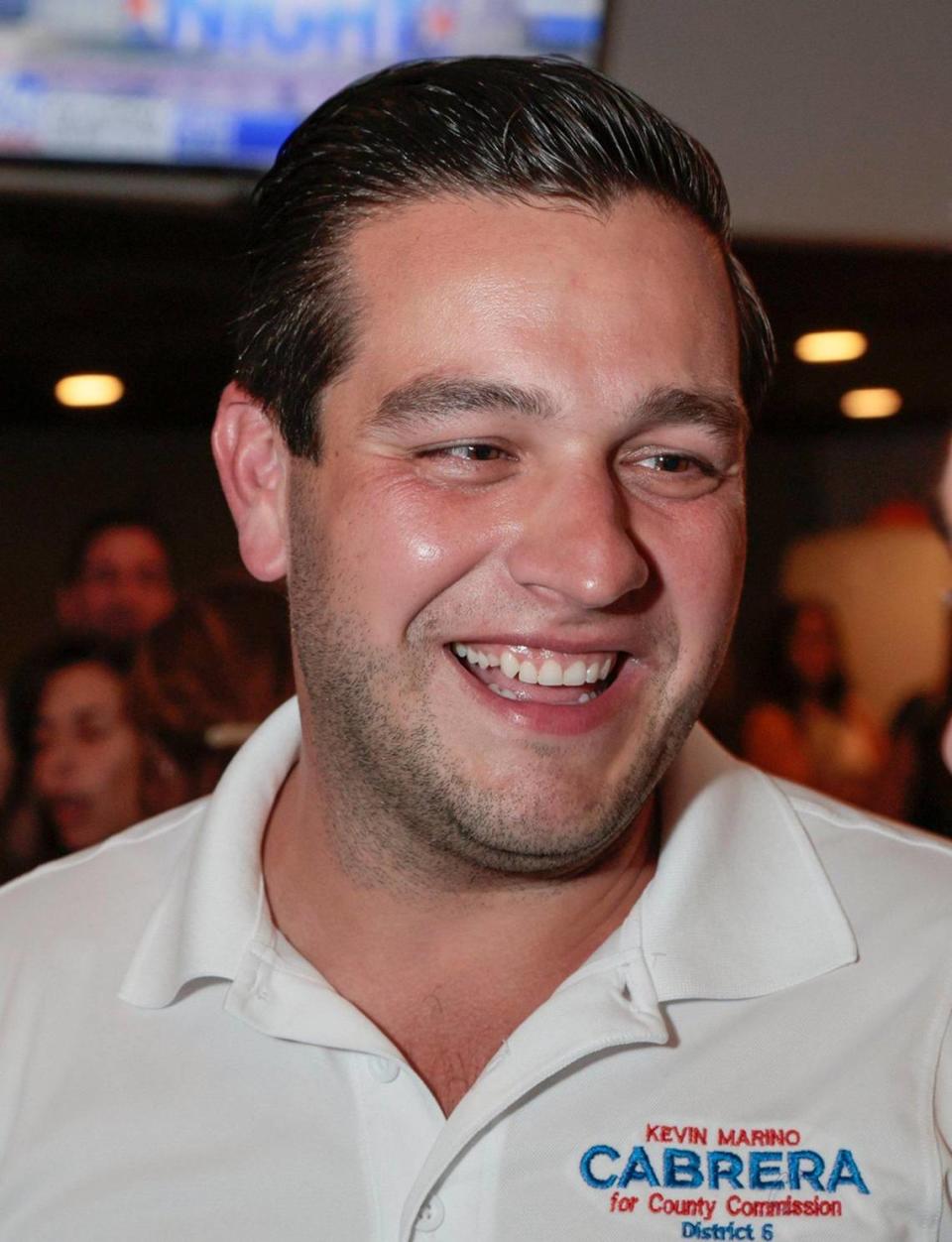Trump-endorsed Miami-Dade commissioner has no business trying to censor book readings | Opinion
- Oops!Something went wrong.Please try again later.
Eager-beaver that he seems to be — at age 8, he already knew he wanted to be a politician — new Miami-Dade Commissioner Kevin Cabrera is, unfortunately, off to a sour start.
At that tender age, he donned a suit to go to Publix with his mother so that his future constituents would get a good first impression.
And went on to study politics at Florida International University and to work on high-profile campaigns that should’ve taught him plenty, like President Donald Trump’s 2020 failed reelection.
But Cabrera, 32, apparently hasn’t learned a thing about what makes this country — which includes Miami, despite local lore attesting to the contrary — a democracy.
Cuban privilege
Last week, Cabrera was sworn in at a ceremony outside of Miami’s iconic Freedom Tower.
On Monday, Cabrera began his job as a county commissioner attacking on Twitter and issuing a statement condemning FIU and the beloved Coral Gables store Books & Books for hosting the author of a book on Cuban immigration policy on Dec. 9.
It is shocking that @FIU's Cuban Research Institute would welcome such hate-filled, inflammatory, anti-Cuban rhetoric to Miami-Dade County, home to the largest Cuban diaspora and the global capital of Cuban-American exiles.
My full statement: pic.twitter.com/J0xv4U9khJ— Commissioner Kevin Marino Cabrera (@KMCabreraFL) November 28, 2022
Cabrera doesn’t like that author Susan Eva Eckstein’s book “Cuban Privilege: The Making of Immigrant Inequality in America” examines the well-known fact that for six decades Cuban immigrants have been granted legalization privileges that other groups don’t obtain shortly after entry.

Goodies — like permanent legal status after one year under the Cuban Adjustment Act signed into law by Democrat Lyndon B. Johnson in 1966 — that come with access to social entitlements and a quick path to citizenship.
In contrast, Haitians, for example, are routinely turned away, and the road to legalization for those who do make it, long and costly.
READ MORE: Miami-Dade commissioner blasts FIU for hosting ‘Cuban Privilege’ author in Coral Gables
Hasn’t read the book
The commissioner hadn’t bothered to read the book. before he opened his mouth to discuss an event that has nothing to do with his non-partisan local government post.
But he’s a Trump pupil and devotee.
Dipping into the tool shed of demagoguery comes with the job description.
He joins the new class of shoot-from-the-hip censors risen in this town by claiming the book is “hate-filled” and “anti-Cuban.” An opinion formed based on a brief video clip he saw of the Boston University professor.
Eckstein pointed out in a Miami Herald interview that she’s not arguing for the removal of Cuban privilege, but for fair, similar treatment of other immigrants. Such details, however, are lost on Cabrera, whose motive isn’t to inform but to incite and create a false narrative.
Cabrera — who should be tending to District 6 priorities like deteriorating quality of life issues instead of telling his alma mater and a local bookstore what to do — confuses scholarly work with public relations writing.
Overstepping Commission role
He also oversteps the boundaries of his role in the Miami-Dade Commission.
Using his position in county government to create a hostile atmosphere around an author and an event in the district he represents is disgusting — but has precedent.
In 2018, he was one of the (once again eager) participants in a protest that included members of the hate group Proud Boys and turned into a scary mob scene. The group tried to stop House Speaker Nancy Pelosi and Congresswoman Donna Shalala from holding a meeting at Shalala’s headquarters.
No, democratic behavior isn’t Cabrera’s forte. But his opening act of censorship tops even his attempt to silence leading Democrats.
He staged his inauguration where refugees like my parents, who fled censorship in Cuba, were processed in the 1960s.
My mother had to resign from the teaching job she adored because she was being forced to teach communism — and here’s the son of Cuban exiles trying to tell us what academic we can or can’t read, what author a city can or can’t host.
Most shameful is Cabrera’s evocation of former Cuban political prisoners he says live in his district as an excuse to attack the book-store event. Fool, do you really think they went to prison to witness the undoing of democracy in Miami?
I sought to speak to Cabrera. But his chief of staff, Manny Orbis, to whom I was told my message was delivered, didn’t bother to call me back.
They’re so confident they have voters in their pocket.
Golden & privileged
Eckstein’s book updates what other academics — including Cuban Americans like Princeton’s Alejandro Portes — have written. It isn’t groundbreaking and has some historical errors and stereotyping, an academic in the process of reviewing it tells me.
But still, it should be discussed and debated.
Portes, who has taught at the University of Miami, was the professor who coined the term “Golden Exile,” and I have interviewed him about this.
Coined early on in a study of Cuban immigrants, Portes isn’t referring to exile success, but specifically to what Eckstein is talking about: The fact that Cubans began their story in this country with preferred status, hence the “golden.”
This helping hand paved the road to the success obtained by hard work, making it possible for Cuban Americans to become one of the most politically powerful minority groups in America.
It is tragic that this is now serving as tool to undermine democracy.
As for our reputation as a community, neither academics like Eckstein nor journalists reporting facts are ruining it. Extremists like Cabrera and their gullible, fanatical base are the ones constantly displaying deplorable behaviors.
Their lack of respect for democratic values, such as academic freedom, are writing ugly chapters of Cuban-American history in Miami.

